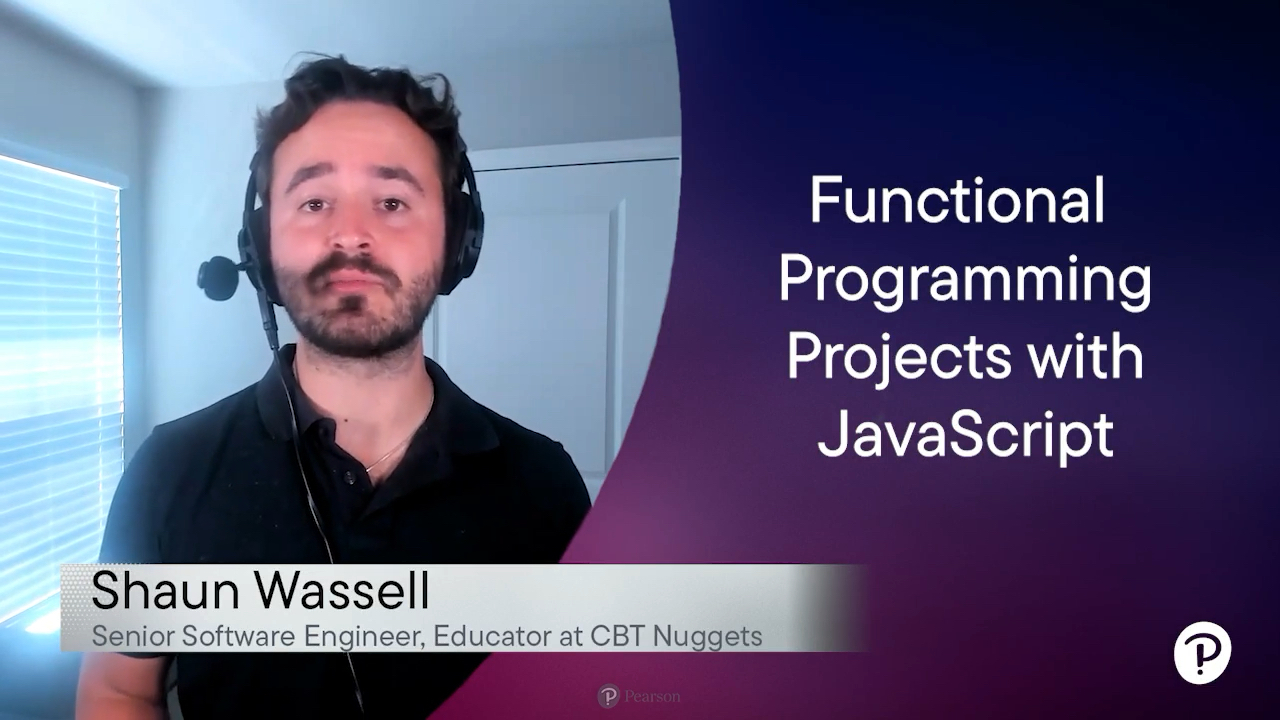Functional Programming Projects with JavaScript (Video Course)
- By Shaun Wassell
- Published Sep 12, 2023 by Addison-Wesley Professional.
Online Video
- Your Price: $239.99
- List Price: $299.99
- About this video
Video accessible from your Account page after purchase.
Register your product to gain access to bonus material or receive a coupon.
Description
- Copyright 2024
- Edition: 1st
- Online Video
- ISBN-10: 0-13-830569-2
- ISBN-13: 978-0-13-830569-7
3.5 Hours of Video Instruction
In learning and following the core concepts of Functional Programming, you can quickly write more maintainable, flexible, and beautiful code.
Description
Functional Programming is a revolutionary way of writing code and is rapidly gaining traction in the world of software development. While Object-Oriented Programming is still the most popular programming paradigm, there are a number of problems that come about when using it--hard-to-find bugs, tightly coupled code, very difficult to scale. Functional programming allows us to solve or avoid all these problems by taking a very different approach to writing software.
Learn all about the core concepts of Functional Programming and how to apply them in JavaScript, mix of screen casting, slides, and coding. Basic functional concepts lead to first class functions, which leads to working with arrays and objects and then advanced functional concepts.
Related Learning
Watch and learn from Shaun's other videos:
- Learn JavaScript: https://learning.oreilly.com/videos/learn-javascript/9780136752899/
- Learn to Program with JavaScript: https://learning.oreilly.com/videos/learn-to-program/9780137560387/
Skill Level
- Beginner to Intermediate
What You Will Learn
- The core concepts of Functional Programming and how to apply them in Javascript
- First-class functions and what we can do with them
- JavaScript's built-in array functions and how they help us work with data
- Advanced functional concepts such as currying, recursion, and composition
Who Should Take This Course
- Software developer
- Programmer
Course Requirements
- Knowledge of JScript syntax
About Pearson Video Training
Pearson publishes expert-led video tutorials covering a wide selection of technology topics designed to teach you the skills you need to succeed. These professional and personal technology videos feature world-leading author instructors published by your trusted technology brands: Addison-Wesley, Cisco Press, Pearson IT Certification, Sams, and Que. Topics include IT Certification, Network Security, Cisco Technology, Programming, Web Development, Mobile Development, and more. Learn more about Pearson Video training at http://www.informit.com/video.
Video Lessons are available for download for offline viewing within the streaming format. Look for the green arrow in each lesson.
Sample Content
Table of Contents
Introduction
Essential Concepts and Syntax
Imperative vs. Declarative Programming
Immutability
Pure Functions
Simple Data Structures
Working with Arrays and Objects Functionally
The Map, Filter, Some, and Any Functions
The Spread Operator
The Reduce Function
First-Class and Higher-Order Functions
What are First-Class and Higher-Order Functions?
Example 1: Sale Price Calculator
Example 2: Printing Function Execution
Example 3: Benchmarking Function Performance
Example 4: Isomorphic Functions for Values and Arrays
Example 5: Function-Call Tracking
Example 6: Argument Checking
Partial Application and Currying
What are Partial Application and Currying?
Dictionary Defaults with Partial Application
URL Building with Partial Application
Automatic Partial Application
Function Memoization
What is Memoization?
Memoization Technniques: Multiple Arguments
Memoization Techniques: Higher-Order Functions
Summary
More Information

